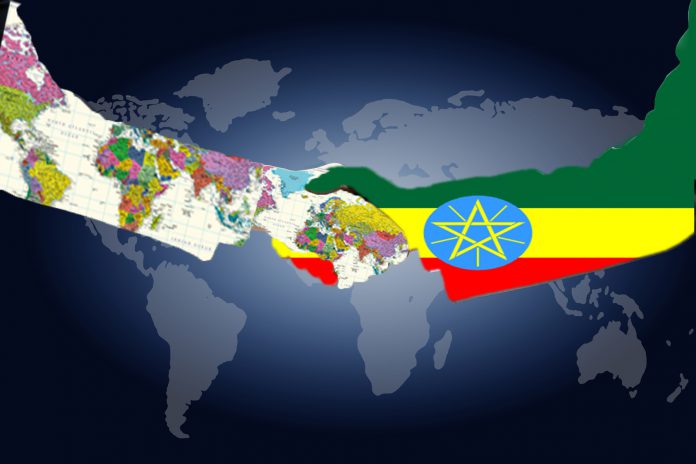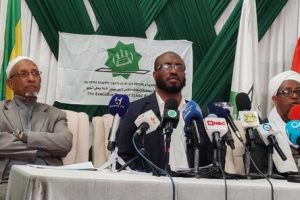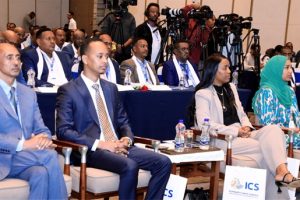
Government’s measure taken to improve the country’s foreign policy amounts to ensuring the economic and security interests of the country provided the policy shifts could properly capture current and future global and regional dynamism, according to scholars.
Prime Minister Dr. Abiy Ahmed on Monday broke the news of foreign policy improvement as he held discussions with Ministry of Foreign Affairs’ diplomats on issues regarding Ethiopian foreign policy. Expert with Foreign Relations Strategic Studies Institute, Luelseged Girma, argues that the international geopolitics has seen dramatic shifts over the decade which the foreign affairs and nationalsecurity policy and strategy (FANSP)fails to embrace.
“Let alone other international developments, security and economic ties with the newest country in our region, South Sudan, ought to properly be explained in our policy.” Normalcy reached with Eritrea is another impetus to revisit the policy, according to him. More importantly, the current policy takes regional security complex in the Horn and Eastern Africa into account leaving aside other important elements, he says. The regional security complex itself has grown to Middle East with the advent of few countries to the Red Sea under the name of protecting security interests.
To him, the planned policy has to bring far-sighted analysis to benefit from the opportunities and take preemptive actions to future dynamisms. Food security, health and migration are no less critical unfolding that demand regional cooperation which the foreign policy ought to include, according to him. The existing policy states that neighboring countries are less important in directly impacting on Ethiopia’s development.
“Seen from the economic development angle, our neighbors are short of capital and finance and cannot be considered sources of investment and development finance. We produce similar products and our markets are small with little impact on development,” FANSP states. Luelseged, however notes: “Products of Ethiopia’s growing industries can get ample market in the neighboring countries and in Africa. In addition, it has to get auxiliary ports from neighboring countries.
Thus, the relations with far-off countries cannot be regarded as a standalone option to the country’s development.” The premier also included the issue of cyber space security in addition to the traditional physical boundary which Luelseged says is a very important aspect that guides countries’ foreign policies.
“The [FANSP] is premised on the proposition that “security policy is a matter of ensuring national survival. The alpha and omega of security is the ensuring of national survival. Other national security issues may be raised only if national existence is ensured,” as Alemayehu Weldemariam states in a 2009 piece of work (Ethiopia’s Foreign Affairs and National Security Policy: The Case for a Paradigm Shift) obtained from SSRN Electronic Journal. As regards with this, Luelseged says that emerging issues such as cyber frontiers and social media decides whether or not a country could sustainably ensure its national security and ultimately its national survival.
Hence, the new policy is sure to probe into these matters and formulate the country’s foreign relations in a way the national survival could properly be protected. Ethiopia has now started an unprecedented journey in all spheres of life. Compounded with the new development in the Horn region such as the peace between Ethiopia and Eretria and between Eritrea and Djibouti along with the region’s and continents continuous economic improvement, the foreign policy shift is a right measure, as the scholar agrees.
“Multi-polar and geopolitical order is shaping foreign relations; hence, Ethiopia’s foreign policy should play into theses by appointing efficient diplomats with particular focus on the neighboring and Middle East countries.” says for his part, Hasabu Tesfa, a lecturer at Debre Birhan University Department of Political Science and International Relations.
Diplomacy has long been central to Ethiopia’s position at continental and global levels. It is through relentless diplomatic efforts that the country has able to host many international, continental and regional blocs and organizations, he states. “Hence, the country should be able to maintain its position by refining diplomatic missions and timely redefining foreign policy.” The country should move into merit-based diplomacy in which right and qualified people are appointed to serve the very interest of the nation.
The country needs to form a diplomatic mission comprised of scholars, influential individuals and the likes, he indicates. Ambassadors and diplomats should be one who can serve their country and do not compromise national interests over courses of government or political changes. Diplomacy is a strong weapon to secure national interests at the global frontiers, he argues.
Herald January 18/2019
BY WORKU BELACHEW





